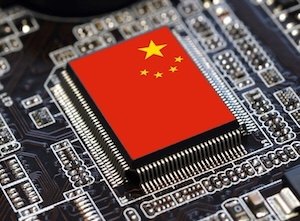The U.S. Effort to Keep AI Out of China’s Hands
Olivia Van Pelt, Braumiller Law Clerk
It comes as no surprise China has been a major focus point of the second Trump administration. One of the key reasons for this focus is the increasing national security concerns over technology. In particular, the smuggling of AI chips, which China intends to use in developing advanced AI systems for military purposes and surveillance.
This is not a newly emerging concern. In October 2022, the Biden Administration issued its first export controls hoping to cut off China from the advanced chips. Since then, restrictions have expanded to include more countries and less-advanced technologies.
Despite these attempts to restrict China’s access, backdoor networks and third parties have taken advantage of loopholes to move advanced chips into China. In 2024 alone, a median estimate of 140,000 advanced AI chips were smuggled to China. The rise in smuggling is one reason for the push of the Chip Security Act introduced in May.
The Chip Security Act is aimed at preventing the diversion of AI technology to China by improving oversight and directing the Department of Commerce (DoC) and Department of Defense (DoD) to study promising chip security measures. Chairman John Moolenaar (R-Mich.) of the House Select Committee on the CCP, Senate Intelligence Chairman Tom Cotton (R-Ark.), and Representative Bill Huizenga (R-Mich.) are leading the bill, with support from a wide range of lawmakers in both chambers. For the full bill, please see https://www.congress.gov/bill/119th-congress/house-bill/3447/text/ih.
“We must do better at maintaining and expanding our position in the global market, while safeguarding America’s technological edge. With these enhanced security measures, we can continue to expand access to U.S. technology without compromising our national security,” said Chairman Cotton.
“I know that we have the technical tools to prevent powerful AI technology from getting into the wrong hands,” said Congressman Bill Foster (D-Ill.), who is co-sponsoring the bill. “With advanced AI chips being smuggled into China and posing a national security risk, Congress must act.”
Specifically, the Chip Security Act would:
- Require location verification for advanced AI chips: Requires a location verification mechanism on export-controlled advanced chips or products with export-controlled advanced chips within six months of enactment.
- Enforce mandatory reporting: Exporters of advanced chips must report and share evidence of AI Chip diversion to restricted actors.
- Study additional safeguards: Requires the DoC, in coordination with the DoD, to study additional chip security methods that could stop U.S. chips from being stolen or misused.
- Recommend alternative export regimes: Requires the DoC to make recommendations annually for three years on how to make export controls more flexible, thus streamlining shipments to more countries.
At the same time that attention appears centered on restricting advanced chip exports, U.S. tech giant Nvidia, says it will soon resume sales of its H20 AI chips to China. This decision comes as a surprise, given that restrictions on advanced chip exports to China have received broad bipartisan support.
In April, the Trump Administration announced that the sale of Nvidia’s H20 chips to China would be restricted due to national security concerns. Since then, Nvidia has been lobbying the administration to reverse the restrictions, arguing that the tighter export controls would cost the company an additional $5.5. billion.
It looks like the lobbying efforts paid off. David Sacks, White House AI and crypto advisor, told Bloomberg that allowing Nvidia to restart Chinese sales of its H20 chip would help the U.S. better compete abroad. Still, “we are not selling the latest and greatest chips to China,” said Sacks.
President Trump faces the challenging task of preventing advanced chips from reaching China while also ensuring American technology companies remain competitive. Future decisions about advanced chips will need to be precise and tightly controlled to navigate this delicate balance.
3 https://www.sec.gov/ix?doc=/Archives/edgar/data/0001045810/000104581025000082/nvda-20250409.htm
Read more articles by this author:
Olivia Van Pelt – https://www.braumillerlaw.com/author/olivia-van-pelt/

